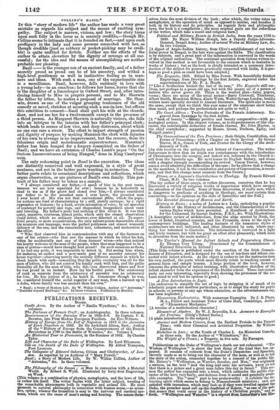COLLINS'S BASIL..
IN this "story of modern life" the author has made a very great mistake as regards his subject and the means of exciting sym- pathy. The subject is narrow, -vicious, and low ; the story turns upon such folly m the lover as is scarcely credible,—though Mr. Collins seems to intimate that it is founded on fact,—and upon such profligacy in the lady and some persons connected with her, as though credible (just as robbery or pocket-picking may be credi- ble) is quite unfitted for fiction. Neither are the efforts of the author to attain elevation by the dignity of revenge at all suc- cessful; for the idea and the means of accomplishing are neither
probable nor pleasing. Basil— is the younger son of an ancient family, and of a father secretly proud as proud can be of his ancestry, and withal a high-bred gentleman as well in instinctive feeling as in man- ners and ideas. With sueh a man, one of the unpardonable sins is a mesalliance. Basil, however, falls suddenly in love with a young lady—in an omnibus ; he follows her home, learns that she is the daughter of a linendraper in Oxford Street, and, after intro- ducing himself to Miss in propria persona, and to Mr. Sherwin the father by letter, he makes a proposal of marriage. Mr. Sher- win, drawn as one of the vulgar grasping tradesmen of the old comedy or novel, clutches at securing such a son-in-law, but affixes this condition to consent—Basil shall quit his wife at the church- door, and not see her for a twelvemonth except in the presence of a third person. As Margaret Sherwin is naturally vicious, she falls into an intrigue in the interim with her father's principal clerk; which leads to scenes of low vice, and deep distresses, about which no one can care a straw. The effort to impart strength of passion and dignity of purpose by making Mannion the clerk with injuries of his own to revenge is no improvement, but the reverse, from it felonious origin and melodramatic superstructure. Mannion's father has been hanged for a forgery committed on the father of Basil ; and we have an extension of Charles Lamb's paper "On the Serious Inconveniences of being Hanged," done in Bing Cambyses' vein.
The only redeeming point in Basil is the execution. The ideas are distinctly conceived and well expressed, in a style of great neatness and not in the better parts wanting in animation. These better parts relate to occasional descriptions and reflections, which argue observation, or are pictures of Basil's own family. This por-
trait of his father may be taken as a sample.
" I always considered my father,—I speak of him in the past tense, because we are -now separated for ever ; because he is henceforth as dead to me as if the grave had closed over him,—I always considered ray father to be the proudest man I ever knew, the proudest man I ever heard of. His was not that conventional de, which the popu- lar notions are fond of characterizing by a st4 stately carriage; by a ngid expression of features ; by a hard, severe intonation of voice ; by set speeches of contempt for poverty and rags, and rhapsodical braggadocio about rank and breeding. My father's pride had nothing of this about it. It was that quiet, negative, courteous, inbred pride, which only the closest observation could detect, which no ordinary observers ever detected at all. To super- ficial people, or mere acquaintances, the only salient points descernible about his mamaers and language, were the perfect politeness and almost womanly delicacy of the one, and the remarkable tact, refinement, and moderation of the other.
"Who that observed him in communication with any of the farmers on any of his estates—who that saw the manner in which he lifted his hat, when he accidentally met any of those farmers' wives—who that noticed his hearty welcome to the man of the people, when that man happened to be a man of genius—would have thought him proud ? On such occasions as these, if he had any pride, it was impossible to detect it. But seeing him when, for instance, an author and a new-made peer of no ancestry entered his house together—observing merely the entirely different manner in which he shook hands with each—remarking that the polite cordiality was all for the man of letters, who did not contest his family rank with him, and the polite formality all for the man of title, who did—you discovered where and how he was proud in an instant. Here lay his fretful point. The aristocracy of rank as separate from the aristocracy of ancestry was no aristocracy for him. He was jealous of it; he hated it. Commoner though he was, he considered himself the social superior of any man, from a baronet up to a duke, whose family was less ancient than his own."
• Basil; a Story of Modern Life. By W. Wilkie Collins. Author of "Antonini'," "Bambles beyond Itailsvays," &c. In three volumes. Published by Bentley.


























 Previous page
Previous page